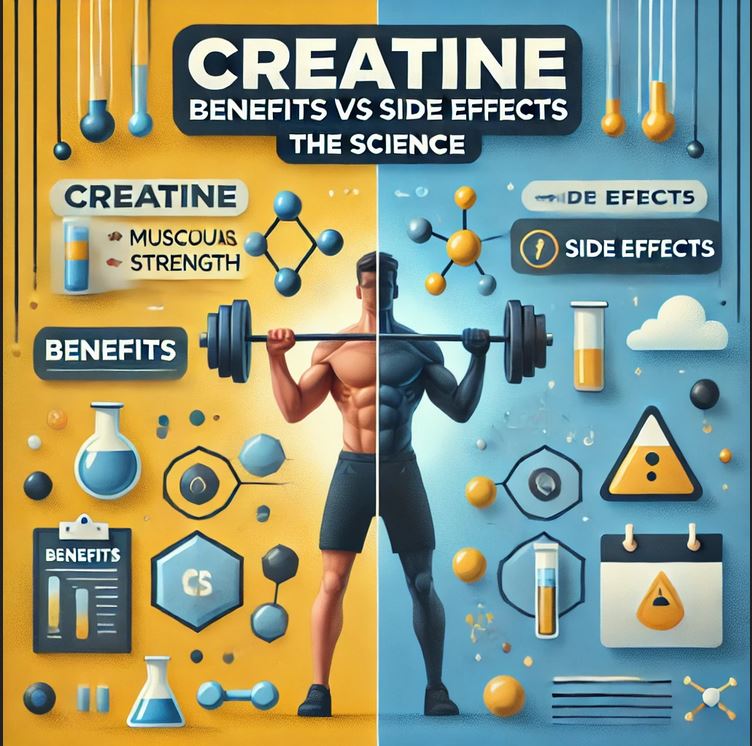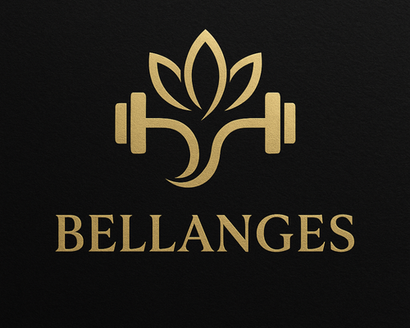Your Cart is Empty
Creatine: Benefits vs Side Effects (The Science) Everything You Need to Know for Better Performance

Creatine: Benefits vs Side Effects (The Science) | Everything You Need to Know for Better Performance
When it comes to boosting athletic performance, enhancing recovery, and building muscle, creatine is one of the most popular and extensively studied supplements in the fitness and wellness community. But what exactly is creatine? How does it work? Are the benefits worth the hype? And more importantly, does it come with any risks? In this comprehensive guide, we will delve into the science behind creatine, exploring its benefits, potential side effects, and the mechanisms that make it one of the most researched supplements on the market.
What is Creatine?
Creatine is a naturally occurring compound found in small amounts in certain foods like red meat and fish. It is also synthesized in the liver, kidneys, and pancreas from three amino acids: arginine, glycine, and methionine. Around 95% of the body’s creatine stores are located in skeletal muscles, where it plays a crucial role in energy production during high-intensity, short-duration activities like weightlifting, sprinting, and jumping.
The body’s natural creatine supply is typically sufficient for normal physiological functions. However, supplementation allows athletes and fitness enthusiasts to enhance their creatine stores, leading to improved performance and other physiological benefits.
How Does Creatine Work?
The Phosphocreatine System
At its core, creatine’s primary function is to replenish adenosine triphosphate (ATP), the body’s primary energy currency. During intense exercise, ATP is rapidly depleted as it provides energy for muscle contractions. Creatine, stored in the muscles as phosphocreatine, donates a phosphate group to adenosine diphosphate (ADP) to regenerate ATP. This process allows you to maintain high-intensity performance for a longer duration.
Enhanced Muscle Hydration
Creatine also pulls water into muscle cells, increasing their hydration. This not only gives muscles a fuller appearance but may also create an environment conducive to protein synthesis and muscle growth.
Benefits of Creatine
1. Improved Athletic Performance
Creatine supplementation has been shown to enhance performance in activities requiring short bursts of high-intensity effort. This includes:
-
Strength Training: Creatine boosts power output, allowing for heavier lifts and greater overall training volume.
-
Sprinting and Jumping: Increased phosphocreatine availability supports explosive movements.
-
Sports Performance: Sports like soccer, basketball, and hockey that demand repeated sprints and quick recoveries benefit significantly from creatine supplementation.
2. Enhanced Muscle Growth
Creatine supplementation can directly and indirectly support muscle growth:
-
Direct Effect: Increased water retention within muscle cells enhances protein synthesis and anabolic signaling.
-
Indirect Effect: Higher energy availability allows for more intense workouts, leading to greater muscle adaptation over time.
3. Faster Recovery
Creatine reduces muscle damage and inflammation following intense exercise, speeding up recovery. This enables athletes to train more frequently and with greater intensity.
4. Cognitive Benefits
Emerging research suggests that creatine’s benefits extend beyond the gym:
-
Improved Mental Performance: Enhanced ATP availability in the brain supports cognitive tasks, especially under conditions of mental fatigue.
-
Neuroprotective Effects: Creatine may offer protective benefits in neurodegenerative diseases like Parkinson’s and Huntington’s.
5. Support for Aging Populations
As we age, natural creatine levels decline, contributing to muscle loss and reduced strength. Supplementation can mitigate these effects, helping older adults maintain muscle mass, strength, and cognitive function.
Side Effects of Creatine: Separating Myths from Reality
While creatine is generally considered safe and well-tolerated, there are several misconceptions about its potential side effects. Here’s what the science says:
1. Water Retention and Weight Gain
-
Reality: Creatine does cause an initial increase in water retention within muscle cells, leading to weight gain. However, this is not fat gain and is often a sign that the supplement is working effectively.
2. Kidney and Liver Health
-
Myth: Creatine is often falsely associated with kidney and liver damage.
-
Science: Multiple studies in healthy individuals show no adverse effects on kidney or liver function with long-term creatine use. However, individuals with pre-existing kidney conditions should consult a healthcare provider before use.
3. Digestive Upset
-
Reality: Some individuals report bloating, cramping, or diarrhea when taking high doses of creatine. These effects can often be minimized by splitting the dose throughout the day and staying well-hydrated.
4. Muscle Cramps and Dehydration
-
Myth: Early anecdotal reports suggested that creatine could cause cramps and dehydration.
-
Science: Research has debunked these claims, showing that creatine may improve hydration status and even reduce the risk of cramping during exercise.
Types of Creatine: Which One Should You Choose?
The market is flooded with various forms of creatine, each claiming to be superior. Here’s a breakdown of the most common types:
1. Creatine Monohydrate
-
Description: The most studied and widely used form of creatine.
-
Pros: High bioavailability, cost-effective, and proven efficacy.
-
Cons: May cause mild digestive upset in some individuals.
2. Micronized Creatine
-
Description: A refined version of creatine monohydrate with smaller particles.
-
Pros: Easier to mix and digest.
3. Creatine Hydrochloride (HCl)
-
Description: Creatine bound to hydrochloric acid.
-
Pros: Requires smaller doses due to enhanced solubility.
-
Cons: More expensive than monohydrate.
4. Creatine Ethyl Ester
-
Description: Marketed as having superior absorption.
-
Pros: Potentially faster uptake.
-
Cons: Limited evidence supports its efficacy over monohydrate.
Dosage and Usage Guidelines
1. Loading Phase
Many users begin with a loading phase to rapidly saturate muscle creatine stores:
-
Dosage: 20 grams per day, split into four 5-gram doses, for 5-7 days.
2. Maintenance Phase
After the loading phase, a lower daily dose is sufficient:
-
Dosage: 3-5 grams per day.
3. Timing
-
Creatine can be taken at any time, but some evidence suggests that post-workout supplementation may slightly enhance muscle uptake.
4. Cycling
-
Is it Necessary?: Creatine does not need to be cycled, as the body’s stores return to baseline once supplementation is stopped.
Who Should Use Creatine?
1. Athletes and Fitness Enthusiasts
Creatine is ideal for individuals engaged in high-intensity or strength-based sports and activities.
2. Aging Adults
Supplementation can help combat age-related muscle and cognitive decline.
3. Vegetarians and Vegans
Since creatine is predominantly found in animal products, vegetarians and vegans often have lower baseline levels and may benefit significantly from supplementation.
Misconceptions and Controversies
Despite its proven benefits, creatine remains surrounded by myths:
-
“Creatine is a steroid.” Creatine is not a steroid; it is a natural compound.
-
“Creatine causes hair loss.” Limited evidence links creatine to increased DHT levels, but more research is needed.
-
“Creatine is only for bodybuilders.” Its benefits extend to endurance athletes, older adults, and even non-athletes.
The Future of Creatine Research
As science continues to evolve, new areas of creatine research are emerging:
-
Creatine and Mental Health: Studies are exploring its potential role in treating depression and anxiety.
-
Creatine and Metabolic Disorders: There is growing interest in its effects on insulin sensitivity and metabolic health.
Creatine is one of the most effective, safe, and versatile supplements available. Whether you’re looking to boost athletic performance, accelerate recovery, or support cognitive health, creatine offers a wealth of benefits with minimal risks. By understanding its science-backed advantages and dispelling common myths, you can make informed decisions about incorporating creatine into your regimen.
Ready to unlock your full potential? Don’t forget to subscribe for more science-backed insights and performance tips, and check out our next video on the top supplements for muscle growth!




